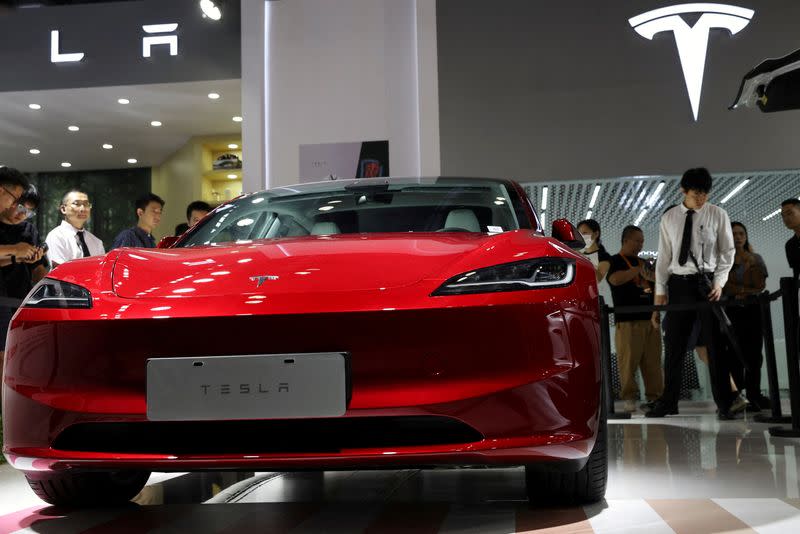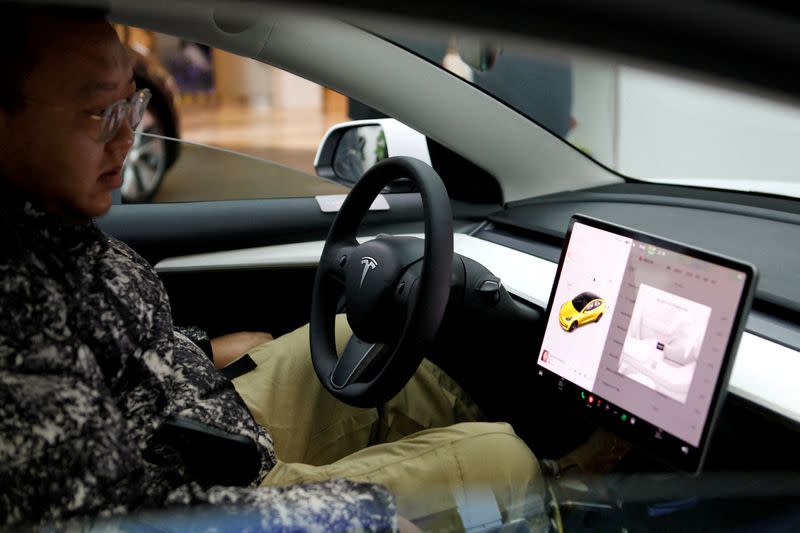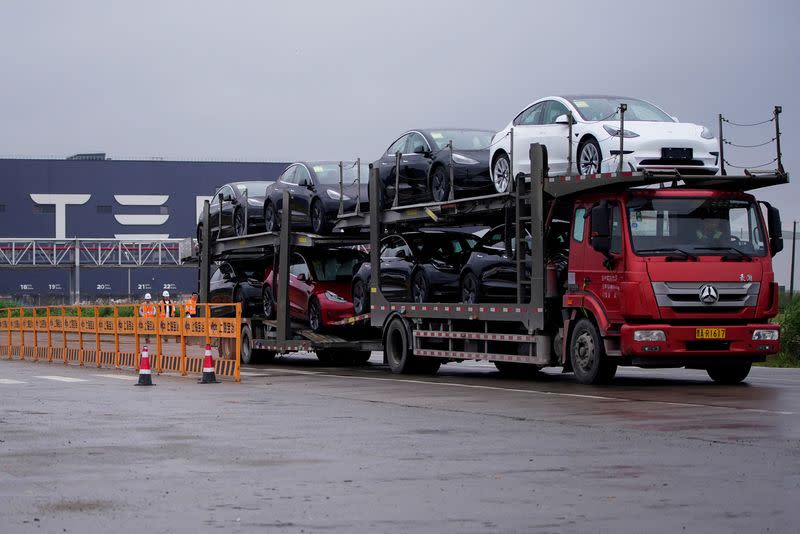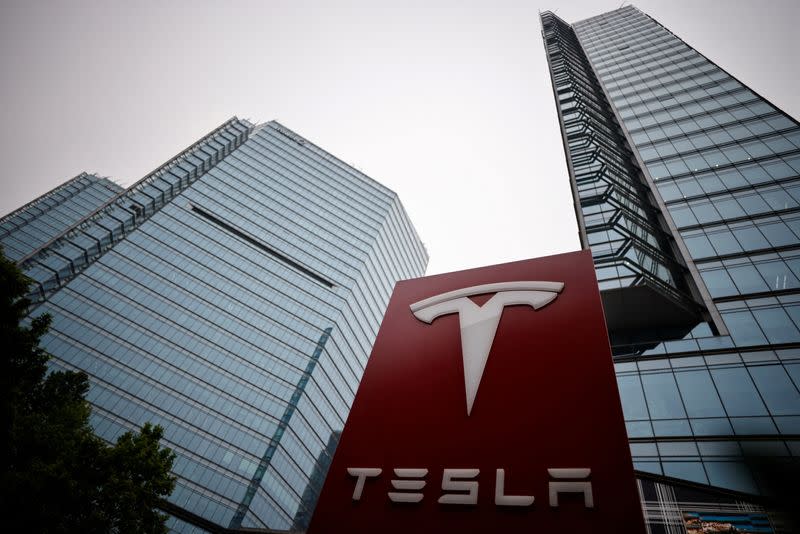Musk pushes plan for China data to power Tesla's AI ambitions
By Fanny Potkin
SHANGHAI/SINGAPORE (Reuters) - Tesla is pushing ahead with plans to power the global development of its self-driving system with data from China that could be processed within the country, part of a strategic shift by Elon Musk, according to people with knowledge of the work.
As part of that effort, Tesla has been developing plans for a data center in China to train the algorithm needed for more fully autonomous vehicles, according to two people, who asked not to be named because the work remains private.
Until recently, Tesla has focused on efforts to secure approval from Chinese regulators to transfer data generated by its EVs in China out of the country for its “Full Self Driving” (FSD) system, according to the two people and an additional person with knowledge of the matter.
It was not clear if Tesla would proceed with both options for handling self-driving data from China - data transfer and a local data center - or if it was developing parallel plans as a hedge.
Tesla's efforts underscore the speed of the electric vehicle maker’s pivot to bet on a breakthrough in AI at a time when EV demand has slowed and its competition has deepened.
Its push to make fuller use of data from vehicles in China to develop the automaker's artificial intelligence for driving comes as the U.S. government has tried to clamp down on the transfer of AI technology from U.S. firms to China.
Tesla has not been able to offer the full version of FSD, which costs the equivalent of almost $9,000, in China.
A wider market for FSD in China would give a boost to the automaker's revenue and profits at a time when both are getting squeezed by pressure from Chinese rivals such as BYD.
Tesla did not respond to a request for comment.
Setting up a data center in China for FSD development would require Tesla to work with a Chinese partner, two of the sources said. There is also a potential hardware-sourcing challenge.
It has had talks with Nvidia about acquiring graphic processing units for a China data center, according to one of the people, who was briefed on the discussions. U.S. sanctions bar Nvidia and its partners from selling its most advanced chips in China.
Nvidia declined to comment on whether it had held talks with Tesla.
Tesla’s campaign to make more use of data from China was kicked into high gear in a whirlwind trip by Musk to Beijing last month when he met with officials including Premier Li Qiang.
In his meeting with Li, Musk sought to smooth permissions for Tesla's data transfer, two of the sources said. The potential of Tesla investing in a data center in China was also raised, they said.
Musk also discussed the possibility of Tesla licensing its FSD systems to Chinese EV makers, one person said. Musk had said in April Tesla was talking to another "major" automaker about licensing FSD without naming it.
China's State Council Information Office did not respond to a request for comment.
THE CHINA EFFECT
China, the world’s largest car market, has the biggest fleet of sensor-equipped cars capable of collecting data from congested cities with complicated traffic patterns, making data generated there valuable for automakers and AI providers.
Musk previously expressed opposition to a China-based data center, arguing that data transfer to the United States was the most efficient option, two people said.
Since 2021, Tesla has stored data collected by its Chinese EVs in Shanghai. Over that time, Tesla's China team has been seeking approvals from Chinese regulators to transfer data out of the country, two people said.
Under a one-year pilot project, companies in Shanghai's Lingang Area, where Tesla's factory is located, will be allowed to transfer certain data without needing further security assessments, Reuters reported on Friday.
Some analysts see Musk as trying to make China a launchpad for self-driving in the same way Tesla’s 2019 bet on its Shanghai Gigafactory allowed it to break through as a mass-market electric vehicle maker.
"It would definitely be a milestone for Tesla if it rolls out FSD in China and leverages the China data for algorithm training," said Yale Zhang, managing director at Shanghai-based consultancy Automotive Foresight.
"China had played a key role in scaling up EV production for Tesla with the Shanghai factory. It would again serve a significant part in scaling up mass adoption of autonomous driving technologies," he said.
Many industry experts expect it will take years before fully autonomous cars are commonplace, but predictions vary widely.
Driver-assistance features now offered in China are "level two" systems, meaning they require a driver ready to take over. Tesla's FSD and its less-advanced options of Autopilot, are also level-two systems requiring attentive drivers.
More fully automated vehicle fleets operated by Baidu, China's biggest search engine operator, and Pony.ai, an autonomous driving startup, run in limited test zones.
But China's EV makers, including BYD, have made self-driving and advanced driver assist systems a priority. Mercedes and BMW have been granted licenses to test level-three systems that allow drivers to take their hands off the wheel and look away on a wider range of roads in China.
At least five automakers - Hyundai, Mazda, Toyota, Volkswagen and Nissan - have approval to transfer some of their data out of China, but none of those approvals are for data to be used to train AI systems, according to lawyers, state media reports and analysts.
Penalties for violating data privacy laws that came into effect in China in 2021 are a major risk factor for data operations, groups representing foreign businesses in China say.
When asked about competition from Chinese EV makers during a call with investors after Tesla’s quarterly earnings last month, Musk said Tesla should be viewed more as an AI company.
He said he was confident Tesla’s FSD system would work “pretty well without modification in almost any market”. It would work better with “country-specific” training, Musk said.
(This story has been refiled to add a dropped word in paragraph 2)
(Reporting by Zhang Yan and Fanny Potkin; Editing by Sonali Paul)




